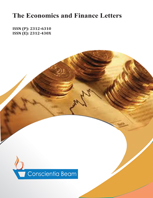Effect of Institutional Factors on Foreign Direct Investment in Nigeria
DOI:
https://doi.org/10.18488/journal.29.2018.51.12.27Abstract
The study investigates the effect of economic, political and social institutions on FDI in Nigeria between 1980 and 2015. The Stock-Watson Dynamic Least Squares (DOLS) is relied upon for analyzing the data extracted from the World Bank WDI. The KPSS stationarity results indicate that all the variables were mixed integrated with FDI and political integration being levels stationary while economic and social factors were first difference stationary. The Johansen cointegration test finds evidence of two cointegrating equations in the model, indicating that long run relationship exists among the variables. The estimated cointegrating regression model showed that economic and social integrations were highly significant in explaining changes in FDI. Political institution factors, on the other hand, have an insignificant positive relationship with FDI. The Wald test showed evidence to support that the coefficients of the regressors were significantly different from zero. The result of the Granger causality test reveals that political and social institution has high predictive power for FDI flows to the Nigerian economy. Based on the findings, this study recommends that Nigeria should adopt a gradual reduction in all economic, political and social constraint to FDI inflows to optimize the benefits of foreign direct investment in Nigeria.

